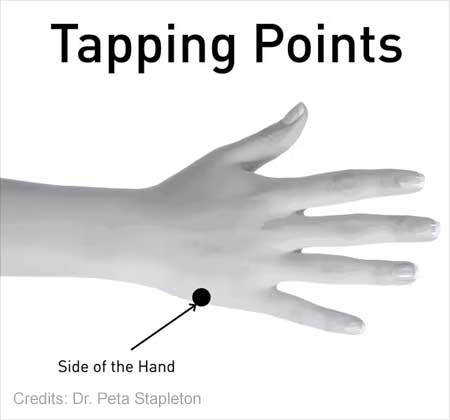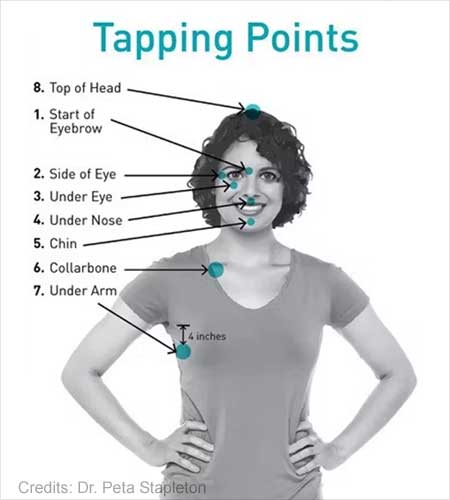- Stress prevails as the major part of life’s anguishes
- However, a brief yet weird self-applied intervention called tapping may help relieve stress in a moment
- Tapping — also known as Emotional Freedom Techniques (EFT) involves stimulating the acupressure points with a gentle two-finger tapping process
Read More..
Stress and Impact
Stress — emotional or physical tension has become the predominant factor of daily lives. Moreover, it is a ‘body’s reaction to a challenge or demand’. One may live through frustration, anger, and nervousness when faced with any stressful event or thought. Although this may have a positive impact in the short runs (e.g., elude dangerous situations or meet a deadline), it can become a key driving mechanism for several diseases and illnesses on longer bursts.Self-Applied Intervention
Emotional Freedom Techniques (EFTs, commonly known as tapping) as an intervention to stress resilience, was initially introduced to Dr. Peta Stapleton (an associate professor in psychology at Bond University) by one of her colleagues in the counseling field (nearly two decades ago). However, the technique was supplemented with these words: “But it’s a bit weird.”Actual surprise and exploration were further stirred into the professor during other sessions (for a community support group for women with eating issues), where a young woman suffered a panic attack and benefitted within a few minutes with the stress-relief technique.
Emotional Freedom Technique
EFT involves stimulating the acupressure points with a gentle two-finger tapping process over the face and body.The technique is now exponentially supported by over 100 randomized clinical trials and is being used by Stapleton for more than 15 years. It is also useful in relieving anxiety, food cravings, phobias, depression, and post-traumatic stress disorder.
Tapping is found to not only alter the body’s biochemistry (e.g., immunity and blood pressure) but also reduce cortisol levels (stress hormone) by 43%. In addition, follow-up studies have also witnessed the tapping benefits up to two years later.
Brain and Tapping
Tapping is also found to have an impact on the brain’s stress center (amygdala) and the memory center (hippocampus). Both amygdala and hippocampus are known to be vital for the decision-making process during a threat-full situation.Moreover, studies have also explored the benefits of tapping in increasing the focus and concentration among primary school children.
Expertise Yourself
Anybody can learn the technique easily, provided one is undergoing a “feeling that they would like to reduce” — generally optimal during a stressful situation.Five basic steps of the technique are as follows:
Step 1: Self-rate your feeling or stress level on a scale of zero to ten; zero being complete calmness to ten being the highest level of stress.
Step 2: It is encouraged that you state your “feeling out loud” to establish engagement and attention to your feelings and tap on a point at the side of the hand. For example, you would say it aloud: “Even though I feel really stressed at the moment because of ______, I accept this is how I feel.”
At this point, make sure you are specific about “why you feel stressed and think about that as you do the tapping process.” This would not reinforce your problems but rather help you be honest with yourself and simultaneously acknowledge your feeling.


Step 5: If your stress rating continues to be still high (out of 10 scales), then continue tapping multiple rounds until you feel lower of the levels (on a scale), or you notice a shift.
Note: You may consider changing the words if you were to think of other feelings as you are tapping. For example, you notice feeling overwhelmed and wishing for support after a few rounds. You may change the words to “I feel overwhelmed” instead.
Explore the Mechanism
It is found that these tapping acupoints send electrical signals to concerned brain areas via the principle of “mechanosensory transduction,” thereby aiding in activating or deactivating the signals.As strange as it appears, tapping is now being recognized as a highly effective module when compared to other conventional treatments and even gold-standard approaches like Cognitive Behavioral Therapy (CBT).
So next time you feel stressed, present yourself with good tapping acupoints.
References:
- Feeling stressed? It’s ‘a bit weird’, but tapping helps – and it’s easy to learn - (https://theconversation.com/feeling-stressed-its-a-bit-weird-but-tapping-helps-and-its-easy-to-learn-171219)
- Feeling stressed? It’s ‘a bit weird’, but tapping helps – and it’s easy to learn - (https://micky.com.au/feeling-stressed-its-a-bit-weird-but-tapping-helps-and-its-easy-to-learn/)
- Stress and your health - (https://medlineplus.gov/ency/article/003211.htm#:~:text=Stress%20is%20a%20feeling%20of,danger%20or%20meet%20a%20deadline)
Source-Medindia
















